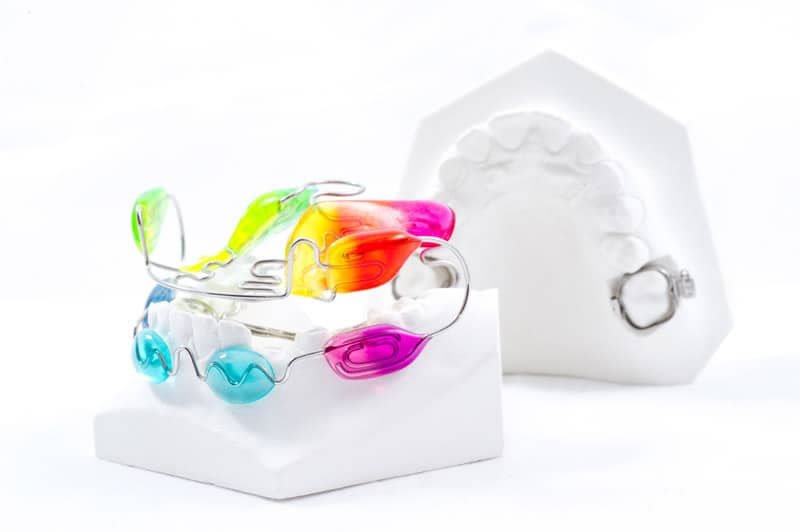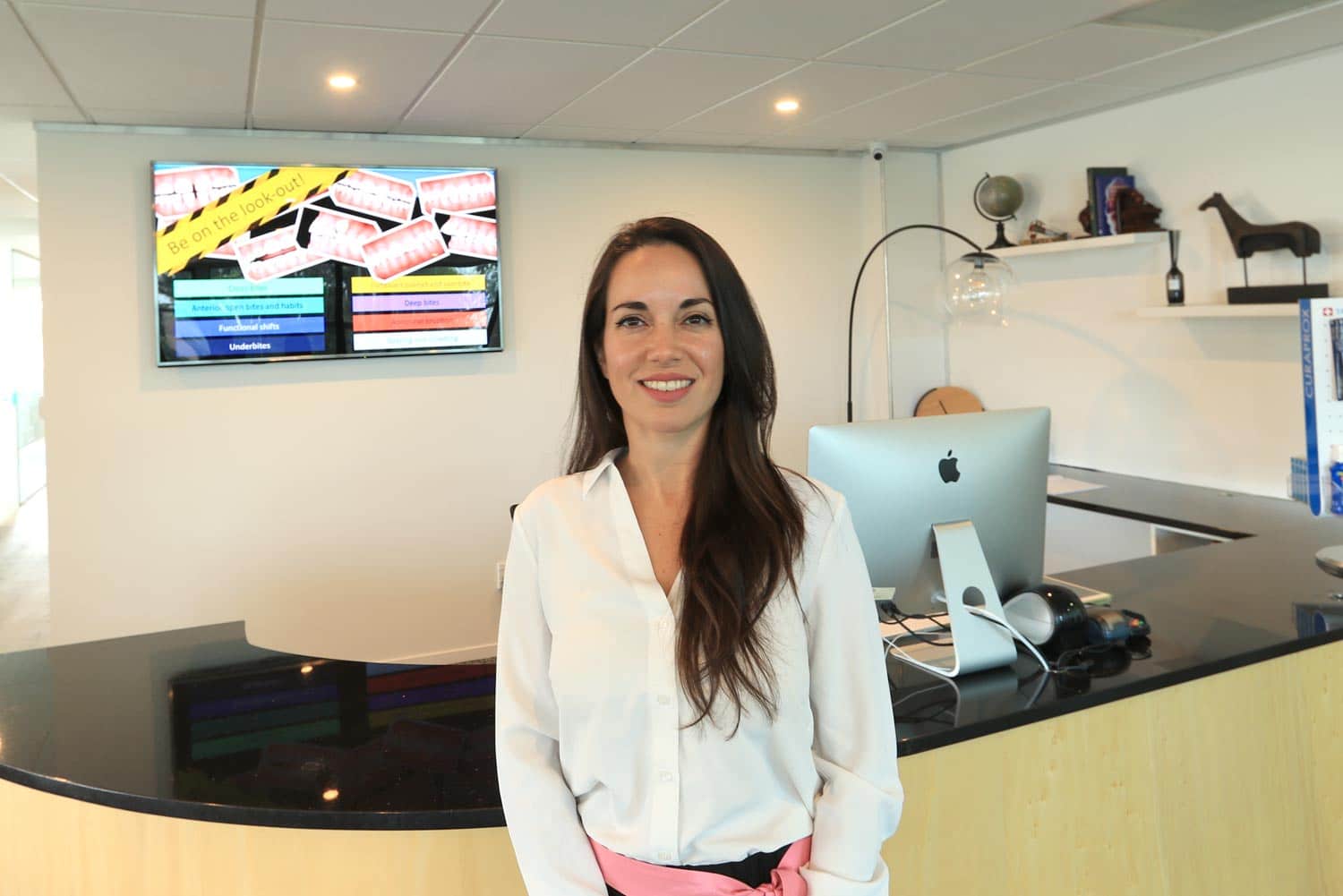
Functional appliances are removable or fixed appliances that are used in growing children in a bid to modify the position of the teeth within the jaws. They may address tooth positional problems which in turn help improve the bite. There are many types of functional appliances each designed differently but all share the same biomechanical principles and so all essentially work the same way.
Jaw and bite problems can occur in all three dimensions of space which is also why there are so many different functional appliances available. Functional appliances have been around for over 100 years and are primarily used for the treatment of Class II malocclusions (an underdeveloped lower jaw where the upper teeth appear to stick out). Functional appliances have also been developed to treat Class III malocclusions (an overdeveloped or large lower jaw that sits forward relative to the upper jaw), anterior open bites (where the front teeth do not close together), deep bites (where there is a large vertical overlap between the front teeth) and others.
Removable functional appliances are basically a set of upper and lower plates (or a single plate) that are custom-made to your child’s teeth. They can be designed in almost any colour and pattern that you want – for this reason, they often reflect their personality and encourages them to take ownership of the plates, helping tremendously with the success of treatment.
There are also fixed functional appliances which, as the name suggests, are fixed in the mouth and are not removed until the end of treatment. These are less popular as they tend to be a little chunky and less comfortable.
Examples of functional appliances include: Twin blocks, Bionator, Frankel II, Andreason Activator, Herbst, Jasper Jumper, Carrier appliance and Forsus springs, to name a few.
Many patients begin treatment with a functional appliance to correct jaw alignment in preparation for braces. This staged approach ensures your bite is optimised before fixed braces are installed.
“We often start with a Twin Block or Herbst to correct the skeleton first, then transition to braces for final alignment of the teeth.”
By the time your functional phase is complete, any remaining crowding or spacing is refined using Braces. This two-step process ensures the most stable and aesthetic results.
Initial Assessment
We’ll analyse jaw position, facial growth status, and bite function using clinical exams and facial x‑rays.
Custom Appliance Fit
Your device is tailored to your mouth and used during growth periods for maximum jaw guidance.
Transition to Braces
Once jaw positioning is stabilised, we fit braces to perfect tooth alignment, bite, and smile symmetry.
Retention Phase
After active treatment, retainers maintain results—whether from functional appliances, braces, or both.
Functional appliances are most effective during ages 8–14 when jaw growth is active. However, adults may still benefit from carefully selected fixed-framework equivalents.
Ideal for correcting an overbite or underbite before braces.
Ensures a healthy bite foundation prior to braces.
Enables precise finishing with braces after skeletal corrections.
For a complete smile transformation—including corrective jaw growth and perfect alignment—visit our comprehensive Braces page to explore how both phases work together.
Book a complimentary evaluation with our specialists to determine the right functional appliance and treatment sequence.
Considering both jaw guidance and full tooth alignment? Your treatment plan may include both functional appliance and braces phases.
Learn about our tailored Braces solutions that seamlessly complement your functional appliance results.
Your orthodontist will instruct you on how to wear your custom-made functional appliances. Follow the instructions carefully as it ensures the success of your treatment and much improved outcomes. You will be seeing your orthodontist regularly for reviews to ensure that the appliances are doing what they are supposed to. Your job is an important one: look after the appliances and keep them clean.
If you are having problems with your appliances, contact the practice as soon as possible. Do not wait until your next appointment.
Clean your appliances at least twice a day with a toothbrush, using liquid soap and water, without toothpaste. Toothpaste should not be used as it contains silica particles that are abrasive and can affect the appearance of the plates. You can also soak your the appliances in white vinegar. If your appliances are removable, please remove your appliances when eating, brushing your teeth or if you are playing a contact sport. Make sure to get into a habit of giving them a thorough wash after each meal, in the morning and night.
Please always keep your removable plates in your mouth as they only work when they are worn. If you need to remove them, please make sure to keep them in the safety box provided. If they are wrapped in tissue or put in your pocket they may be lost or damaged. Be extremely careful with your plates as if you lose or damage them you will be charged for their replacement.
Follow these instructions carefully and your treatment should be an absolute success. If you have any questions please do not hesitate to contact the practice.
These appliances are usually very comfortable (cause no pain), but they do take a little getting used to, especially in the few days after fitting. Expect them to feel like a mouthful for the first couple of days, and for your speech to sound a bit funny. You will also find that your saliva flow increases during the first two nights. Most patients will have little to no issues with speech past the first 10 days.
Damaged or lost plates and other appliances lengthen the overall treatment time and can add an additional cost to treatment. Please look after your appliances to make your treatment go as smoothly as possible. If your plates or appliances are misplaced or damaged, please give us a call and let us know immediately. We will make arrangements for a new one.
In 2008, Adriana graduated with a Bachelor of Dental Surgery from Santa Maria University in Caracas, Venezuela. After graduation, she worked in Venezuela in private practice, at the Orthopaedic Children’s Hospital (Dentistry/Orthodontics unit), and as a lecturer in the National Experimental University of the Armed Forces.
In the year 2011, Adriana moved to Argentina to specialise, gaining the Specialist Orthodontist degree from the University of Buenos Aires in 2013. While in Argentina, she worked as a part-time lecturer at the Orthodontics Department in the University of Buenos Aires, private practice, and at the Craniofacial Unit in the Paediatric Hospital Garrahan, looking after cleft lip new-born, children, and adolescent patients.
Adriana is a Spanish speaker. On her spare time she likes going to the beach, travelling, socialising with friends, playing video games, cooking, and going to the gym.

BDS | DClinDent | MRACDS-Orth | MOrthRCSEd
Dr Azza Al-Ani, grew up in Christchurch, is a registered specialist orthodontist working at Shakespeare Orthodontics in Auckland. You can find her at one of the clinics in the city, or at their Takapuna clinic on the North Shore.
In 2009, Azza graduated with a Bachelor of Dental Surgery with Credit from the University of Otago.
She worked as a dental house surgeon at Auckland, Greenlane and Middlemore Hospitals; and as a dental officer at Sydney’s Westmead Hospital.
In 2012, she completed the Royal Australasian College of Dental Surgeons (RACDS) primary examinations.
Before commencing her specialist training, she held a part-time Professional Practice Fellow position at the Faculty of Dentistry, while working as a dentist in private practice.
In 2016, Azza graduated from the University of Otago with a Doctor of Clinical Dentistry in Orthodontics. She passed examinations to gain memberships into the Royal Australasian College of Dental Surgeons and the Royal College of Surgeons of Edinburgh.
She is also certified with the Australasian Orthodontic Board, and is a member of the New Zealand Association of Orthodontists, and the New Zealand Dental Association.
Azza’s area of research interest is hypodontia.
She has presented about this topic at the European Orthodontic Society Congress, and at the International Association Dental Research ANZ Scientific Meeting, and has been involved in the publication of numerous articles in peer-reviewed journals.
Outside of work, Azza loves spending time with her son and Mo (her husband), socialising with family and friends, overseas travel, and tries to keep up with Mo mountain biking.

Mo is a Specialist Orthodontist. He grew up in both New Zealand and Australia.
After completing a year in Health Sciences, and later physiotherapy, he qualified as a dentist in New Zealand. He spent the next four years working alongside his father in Sydney where he practised general dentistry. Mo then returned to Dunedin to specialise, gaining his specialist degree – Clinical Doctorate in Orthodontics from the University of Otago.
During the three years of specialist training, Mo had the privilege of learning from the best. The combined clinical and academic acumen of professors, doctors and staff provided an invaluable experience.
Meanwhile, Mo published and presented significant research and clinical cases at both national and international forums, including the International Association of Dental Research, the Australasian Begg Society of Orthodontics, the European Orthodontic Society and the New Zealand Dental Association conference.
A firm believer in maintaining high clinical standards, Mo successfully completed further examinations to become affiliated with the Royal College of Surgeons (Edinburgh) and the Royal Australasian College of Dental Surgeons (Sydney).
Mo is currently a part time senior lecturer at Auckland University of Technology, a Fellow of the World Federation of Orthodontists and also holds professional memberships with the New Zealand Association of Orthodontists, the New Zealand Dental Association and American Association of Orthodontists.
He has also been involved in the supervising and lecturing of students at the Auckland University of Technology.
Outside of work, Mo enjoys the precious time with his young family and the outdoors. He especially loves mountain biking, running, fishing, diving and, in winter, snowboarding.
Traveling along with his best friend and wife (Azza) around the world has also been a big part of Mo’s life. Mo is primarily based in Shakespeare Orthodontic’s city clinics and on the North Shore.
